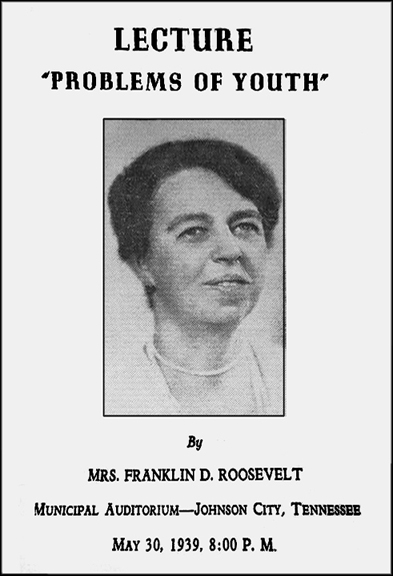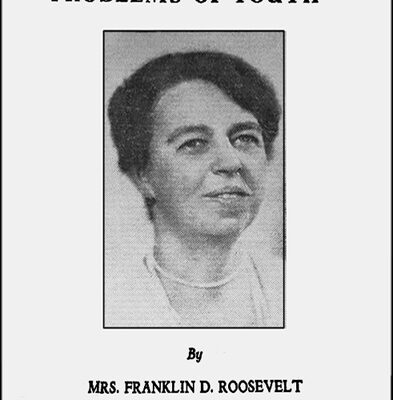In 1935, Mrs. Eleanor Roosevelt wrote an article titled “Facing the Problems of Youth” for the February edition of “National Parent-Teacher Magazine.” She later used the subject as she began traveling around the country giving lectures.

The first lad made a stopover in Johnson City on May 30, 1939 and delivered a brief speech that mirrored her article, shortening the title to “Problems of Youth.” The event took place at 8:00 p.m. in the big City Hall auditorium at the northwest corner of West Main and Boone streets. As you read her comments, think about how things have changed, yet remained the same over the past 77 years. Here are excerpts from her talk:
“Education today is not purely a question of the education of youth; it is a question of the education of parents, because so many parents, I find, have lost their hold on their children. One reason for this is that they insist on laying down the law without allowing a free intellectual interchange of ideas between themselves and the younger generation.
“I believe that as we grow older we gain some wisdom, but I do not believe that we can take it for granted that our wisdom will be accepted by the younger generation. We have to be prepared to put our thinking across to them. We cannot simply expect them to say, ‘Our older people have had experience and they have proved to themselves certain things, therefore they are right.’ That isn't the way the best kind of young people think. They want to experience for themselves.
“I find they are perfectly willing to talk to older people, but they don't want to talk to older people who are shocked by their ideas, nor do they want to talk to older people who are not realistic. We might just as well accept things, which are facts as facts and not try to imagine that the world is different, more like what we idealized in the past.
“But if the relationship is such that youth has no desire to talk to older people, then, I think, it is entirely impossible to help the youth of today—and they need help badly. I think they are very glad to have it, too, when it is given in a spirit of helpfulness, not self-righteousness. We don't need to idealize things that are past; they look glamorous, but perhaps they were not so glamorous when we really lived through them.
“My own feeling would be that the most important education is the education which will enable us, both in our homes and in our schools, to understand the real problems that our children have to meet today. It is easy enough to impart book knowledge, but it is not so easy to build up the relationship between youth and older people, which is essential to the working out of their problems—very difficult problems on which young people need our leadership and our understanding.
“We cannot pass over the fact that the world is a hard world for youth and that so far we have not really given their problems as much attention as we should. We smile—I smiled myself the other day when one young boy said that he hoped to go in and clean up politics. Politics need to be cleaned up, of course. Everything that is human needs that particular kind of enthusiasm.
“But we older people know that we don't always succeed as easily as these young ones think they can. Yet I doubt if we should smile. I think that we should welcome their help, and find places where this tremendous energy that is in youth—if it cannot be used immediately in making a living—may at least be used where it is so greatly needed today.
“I should like to leave with you this one idea which I have been thinking about a great deal of late: the necessity for us as parents, as teachers, as older people, to put our minds on the problems of youth, to face realities, to face the world as it is and the lives that they have to live—not as we wish they were, but as they are – and, having done that, to give our sympathetic help in every way that we can.”

Comments are closed.